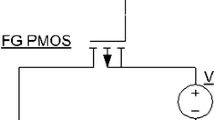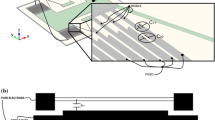Abstract
In this work, a study case is presented in which the design of the layout for a CMOS sensor cell is partially automated by implementing a metaheuristic algorithm to find the best tradeoff between two conflicting objectives (two quantitative opposite and not totally independent yet desired performance or design qualities) among the set of feasible layout and electronic device configurations within a constricted search space. The feasibility of a solution (a particular configuration) and its capability to fulfill every requested objective, is determined by its compliance to the CMOS-MEMS design rules and fabrication process. Any given solution besides showing optimal or very near-to-the-optimal characteristics, must be suitable to be fabricated in the CMOS conventional process which for this case is a \(0.5\,\mu \hbox {m}\), 3-metal 2-poly N-well fabrication, beside this, since monolithic inertial sensors generally contains embedded movable electromechanical parts a surface micromachining must be considered. Simulation data and behavior of the bio-inspired metaheuristic algorithm used during the design process are presented, as well as electromechanical simulation results based the automatic-generated solutions.























Similar content being viewed by others
References
Abarca-Jimenez GS, Reyes-Barranca MA, Mendoza-Acevedo S (2013) MEMS capacitive sensor using FGMOS. In: 2013 10th International Conference on Electrical Engineering, Computing Science and Automatic Control, CCE 2013, pp 421–426
Abarca-Jimnez GS et al (2018) Inertial sensing MEMS device using a floating-gate MOS transistor as transducer by means of modifying the capacitance associated to the floating gate. Microsyst Technol 24(6):2753–2764
Jacob BR (2005) CMOS: circuit design, layout, and simulation
Bykov IS, Aleksei LP (2017) On distance Gray codes. J Appl Ind Math 11(2):185–192
Censor Y (1977) Pareto optimality in multiobjective problems. Appl Math Optim 4(1):41–59
Coello-Coello CA (2001) A short tutorial on evolutionary multiobjective optimization. In: International Conference on evolutionary multi-criterion optimization. Springer, pp 21–40
Coello-Coello CA (2015) Multi-objective evolutionary algorithms in real-world applications: some recent results and current challenges. In: Advances in evolutionary and deterministic methods for design, optimization and control in engineering and sciences. Springer, pp 3–18
Granados-Rojas B et al. (2016) 3-layered capacitive structure design for MEMS inertial sensing. In: 2016 13th International Conference on Electrical Engineering, Computing Science and Automatic Control (CCE), pp 1–5
Granados-Rojas B et al. (2017) Basic readout circuit applied on FGMOS-based CMOS-MEMS inertial sensing prototypes. In: 2017 14th International Conference on Electrical Engineering, Computing Science and Automatic Control (CCE), pp 1–6
Granados-Rojas B (2018) Application and Resulting Suitability of a Genetic Algorithm in the Design of FGMOS-based CMOS-MEMS Transducers. In: et al (2018) 15th International Conference on Electrical Engineering. Computing Science and Automatic Control, CCE, p 2018
Lopez-Jaimes CC (2015) Many-objective problems: challenges and methods. Springer handbook of computational intelligence. Springer, New York, pp 1033–1046
Murata Tadahiko, Ishibuchi Hisao, Tanaka Hideo (1996) Genetic algorithms for flowshop scheduling problems. Comput Ind Eng 30(4):1061–1071
ON Semiconductor C5X (2020), 0.5 Micron Technology Design Rules 4500099 Rev. X, p 99
Razavi B (2002) Design of analog CMOS integrated circuits. Tata McGraw-Hill Education, London
Yang Z, Tang K, Yao X (2008) Large scale evolutionary optimization using cooperative coevolution. Inform Sci 178(15):2985–2999
Acknowledgements
Authors would like to thank to the VLSI group members at Cinvestav for the support given to this project and to Conacyt for the scholarship #295930 granted to B. Granados-Rojas.
Author information
Authors and Affiliations
Corresponding author
Additional information
Publisher's Note
Springer Nature remains neutral with regard to jurisdictional claims in published maps and institutional affiliations.
Rights and permissions
About this article
Cite this article
Granados-Rojas, B., Reyes-Barranca, M.A., González-Navarro, Y.E. et al. Two-objective metaheuristic optimization for floating gate transistor-based CMOS-MEMS inertial sensors. Microsyst Technol 27, 2889–2901 (2021). https://doi.org/10.1007/s00542-020-05194-w
Received:
Accepted:
Published:
Issue Date:
DOI: https://doi.org/10.1007/s00542-020-05194-w




